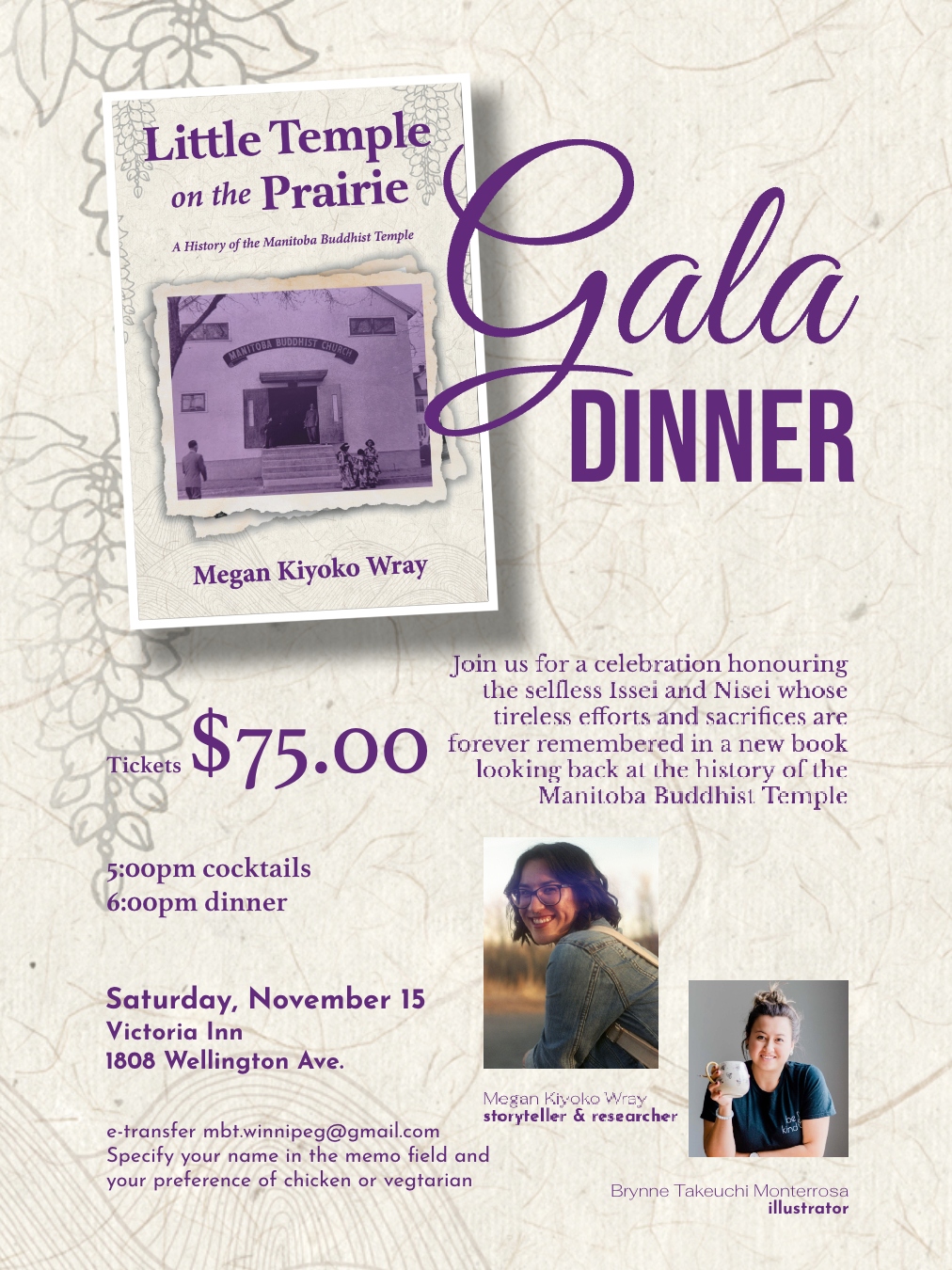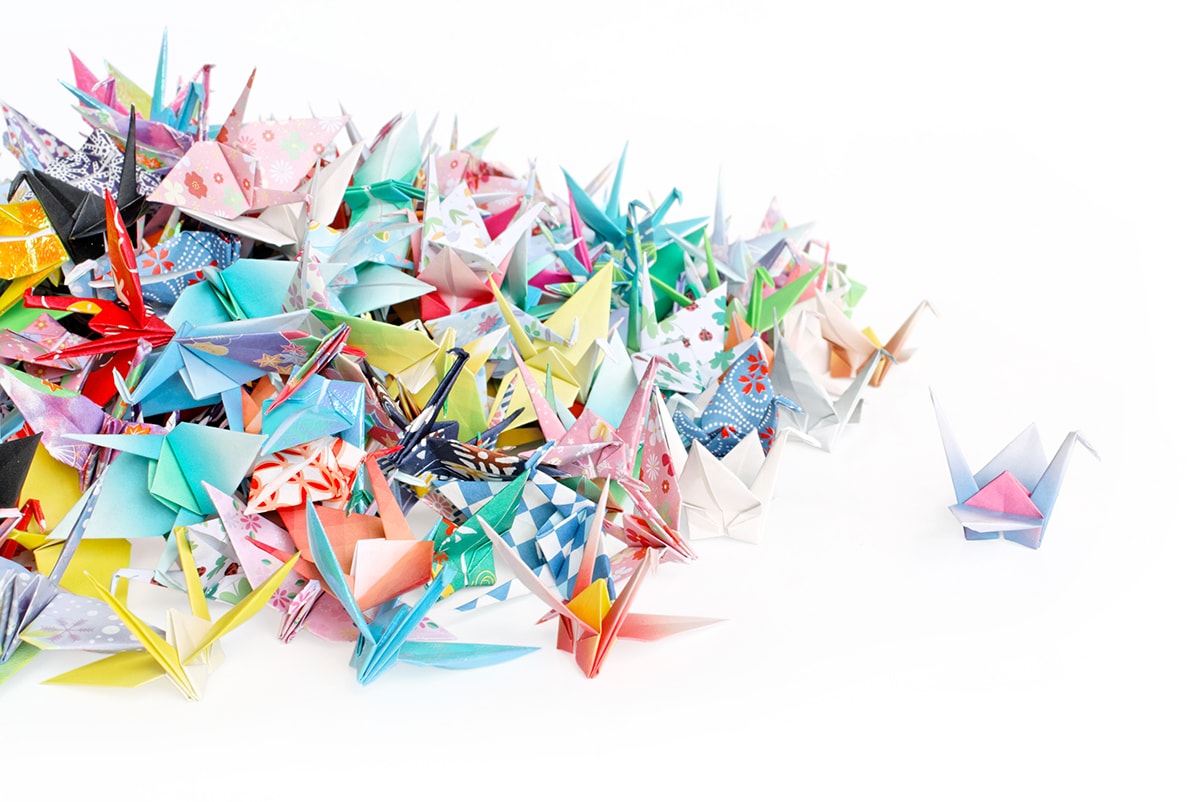Little Temple on the Prairie

Get your tickets now to attend the "Little Temple on the Prairie" celebration and book launch banquet on Saturday, November 15 at the Victoria Inn and Conference Centre in Winnipeg.
This celebration honours the selfless Issei and Nisei who created the Manitoba Buddhist Temple and whose tireless efforts and sacrifices are forever remembered.
Tickets are $75.00 and are available by e-transferring to mbt.winnipeg@gmail.com. Please specify you name(s) in the memo field and your preference of chicken or vegetarian.
Buddhism 101

Jodo Shinshu Buddhism was founded 8,000 kilometres east of Winnipeg more than 800 years ago. Its origins involve a radical monk, a Pure Land, and, as is true of all Buddhist schools of thought, the goal of Enlightenment. The tradition’s relatively recent history in Canada is intertwined with the devastating internment, during the Second World War, of Japanese Canadians—the descendants of farmers and fishermen who brought Jodo Shinshu to B.C. and Alberta in the 1800s.
So even before you try to start unpacking the religion’s pivotal Primal Vow of Amida or attempt to memorize the Nembutsu chant, there’s a lot to learn. That's why the Manitoba Buddhist Temple is offering a Buddhism 101 class to get you started. The session is free, just bring your curiosity and an open mind. The Manitoba Buddhist Temple invites all those interested in exploring and learning what Buddhism has to offer with an introduction on Saturday, March 1, at 1pm. Admission is free and parking is available at the Health Sciences Centre parking lot across from the temple.
The session will be led by Sensei James Martin. Sensei Martin was born and raised in rural Manitoba and encountered Buddhism while travelling in various parts of Asia. He has trained and studied Jodo Shinshu Buddhism in Kyoto, Japan and Berkeley, California. Most recently, he was the resident minister of the Calgary Buddhist Temple until his retirement in 2019.
Please RSVP if you are interested:
tanismoo@gmail.com
Community Fund
The JCLS approved two grants for the Bento Box and the Manitoba Buddhist Temple History Preservation projects in 2024. We are grateful to JCLS for their support that allows us to recognize and honour our elder members who survived the WWII internment of Japanese Canadians.

Keirokai celebration, May 2023
The $14 million Community Fund addresses the enduring intergenerational impact that government actions had on the Japanese-Canadian community. The program not only honours the past, but invests in the future by allocating funds to six project streams: community projects, arts, sports, scholarships, infrastructure, and intergenerational wellness.
As we did in 2022 during the pandemic, the Manitoba Buddhist Temple will be delivering Bento boxes to the approximate 30 sangha members who are survivors of the internment. The meals provided are in gratitude of the difficulties and hardships they endured and for their strength and resiliency in overcoming adversity.

The second grant for 2024 is for a research project to document and preserve the 77-year history of the Manitoba Buddhist Association Inc., including gathering of photos and videos, as well as compiling the MBT History Book, Bulletins, newspaper and television coverage, and interviews with elder members.
It is hoped that the initiatives funded by the Japanese Canadian Legacies fund will honour our elders past and present and for generations to come.
1000 Cranes Project

An ancient Japanese legend promises that if anyone folds a thousand paper cranes they will be granted a wish by the gods. And as a symbol of hope, the Manitoba Buddhist Temple is asking for your help to make 1000 origami cranes - wishing for peace, understanding, and support for all those suffering from racism and other forms of discrimination.
The Japanese name for the origami crane is called “Orizuru” which means “Folded crane.” In Japan the crane is said to live for 1,000 years which is why one must fold 1,000 of them. The origami crane’s popularity is largely due to a children’s book written by Canadian author, Eleanor Coerr called “Sadako and the Thousand Paper Cranes.”

According to Sadako’s family she managed to fold approximately 1,400 paper cranes before dying on the morning of October 25, 1955. Many of these cranes have been donated to places such as the 9-11 memorial in New York City, Pearl Harbour, the Museum of Tolerance and more places as a symbol of peace.
Folding a crane is actually not too difficult. All you need is a single square sheet of paper.
Once completed, the cranes will be put on display at locations throughout the city of Winnipeg.
For more information, contact Sensei Tanis Moore of the Manitoba Buddhist Temple.
tanismoo@gmail.com
source: https://origami.me/


